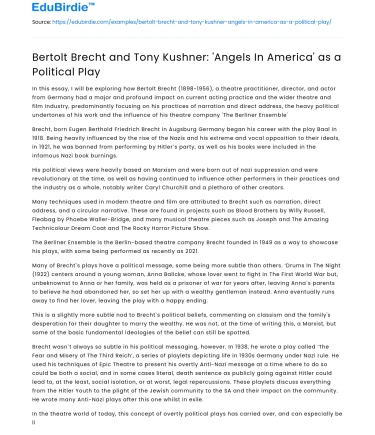In this essay, I will be exploring how Bertolt Brecht (1898-1956), a theatre practitioner, director, and actor from Germany had a major and profound impact on current acting practice and the wider theatre and film industry, predominantly focusing on his practices of narration and direct address, the heavy political undertones of his work and the influence of his theatre company 'The Berliner Ensemble'
Brecht, born Eugen Berthold Friedrich Brecht in Augsburg Germany began his career with the play Baal in 1918. Being heavily influenced by the rise of the Nazis and his extreme and vocal opposition to their ideals, in 1921, he was banned from performing by Hitler`s party, as well as his books were included in the infamous Nazi book burnings.
Save your time!
We can take care of your essay
- Proper editing and formatting
- Free revision, title page, and bibliography
- Flexible prices and money-back guarantee
His political views were heavily based on Marxism and were born out of nazi suppression and were revolutionary at the time, as well as having continued to influence other performers in their practices and the industry as a whole, notably writer Caryl Churchill and a plethora of other creators.
Many techniques used in modern theatre and film are attributed to Brecht such as narration, direct address, and a circular narrative. These are found in projects such as Blood Brothers by Willy Russell, Fleabag by Phoebe Waller-Bridge, and many musical theatre pieces such as Joseph and The Amazing Technicolour Dream Coat and The Rocky Horror Picture Show.
The Berliner Ensemble is the Berlin-based theatre company Brecht founded in 1949 as a way to showcase his plays, with some being performed as recently as 2021.
Many of Brecht`s plays have a political message, some being more subtle than others. ‘Drums In The Night (1922) centers around a young woman, Anna Balicke, whose lover went to fight in The First World War but, unbeknownst to Anna or her family, was held as a prisoner of war for years after, leaving Anna`s parents to believe he had abandoned her, so set her up with a wealthy gentleman instead. Anna eventually runs away to find her lover, leaving the play with a happy ending.
This is a slightly more subtle nod to Brecht`s political beliefs, commenting on classism and the family's desperation for their daughter to marry the wealthy. He was not, at the time of writing this, a Marxist, but some of the basic fundamental ideologies of the belief can still be spotted.
Brecht wasn`t always so subtle in his political messaging, however. In 1938, he wrote a play called ‘The Fear and Misery of The Third Reich’, a series of playlets depicting life in 1930s Germany under Nazi rule. He used his techniques of Epic Theatre to present his overtly Anti-Nazi message at a time where to do so could be both a social, and in some cases literal, death sentence as publicly going against Hitler could lead to, at the least, social isolation, or at worst, legal repercussions. These playlets discuss everything from the Hitler Youth to the plight of the Jewish community to the SA and their impact on the community. He wrote many Anti-Nazi plays after this one whilst in exile.
In the theatre world of today, this concept of overtly political plays has carried over, and can especially be linked to Brecht`s work, with similarities in tone and style to those of the 1920s and 1930s.
Tony Kushner`s two-part play ‘Angels In America’ is a perfect example of this. Set in America in the 1980s, ‘Angels In America’ focuses on the journey of a community in New York City ravaged by AIDS. Kushner expertly uses multi-rolling and other epic theatre techniques to tell the story of Prior Walter, an AIDS patient, and his partner Louis Ironson. The overt political alignment of the play is focused on the disdain of the LGBT community and its allies towards the president of the US at the time, Ronald Reagan. An article by Vox in 2016 perfectly illustrates the official stance on the crisis in the mid-1980s. German Lopez, a reporter for Vox wrote an article titled 'The Reagan administration's unbelievable response to the AIDS epidemic' and references a Scott Calonico documentary titled ‘When AIDS Was Funny’ in which it is reported White House officials referred to the AIDS epidemic as the 'gay plague' and joked about reporters having the condition.
Kushner used this fury felt by large swathes of the American public as fuel for his play, something many would argue was popularised by Brecht, if not totally created by him, evidencing the claim that Brecht`s influence regarding political plays is firmly felt today, with productions of not only his own works but similar works by other writers being performed or otherwise enjoyed today.
Brecht is also famous for the creation of Epic Theatre, a set of techniques that were commonplace in Brechtian works, both his original writings and his adaptations of others' works






 Stuck on your essay?
Stuck on your essay?

